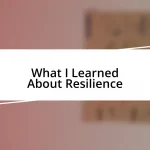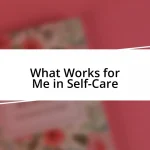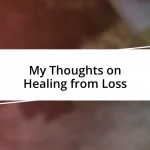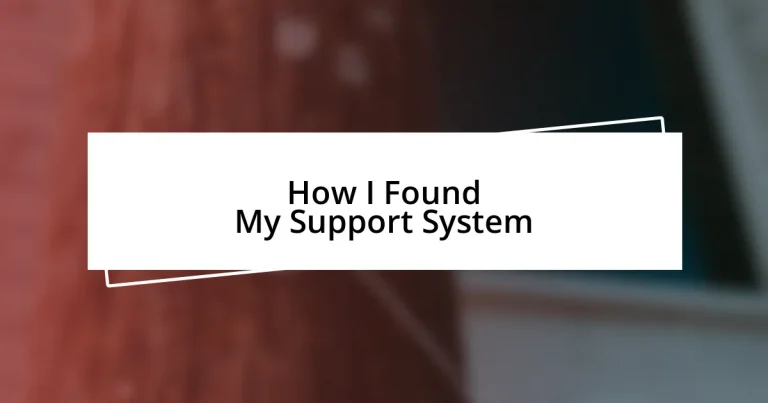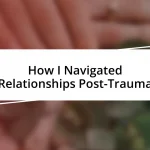Key takeaways:
- Support systems consist of individuals who provide emotional, practical, or informational support, and recognizing their value is essential for personal well-being.
- Assessing personal needs helps in identifying who in your network can provide specific types of support, enhancing meaningful connections.
- Engaging in activities and being open to new experiences fosters genuine relationships, creating a supportive community.
- Maintaining support networks requires intentional communication and vulnerability, which can strengthen bonds and create lasting relationships.
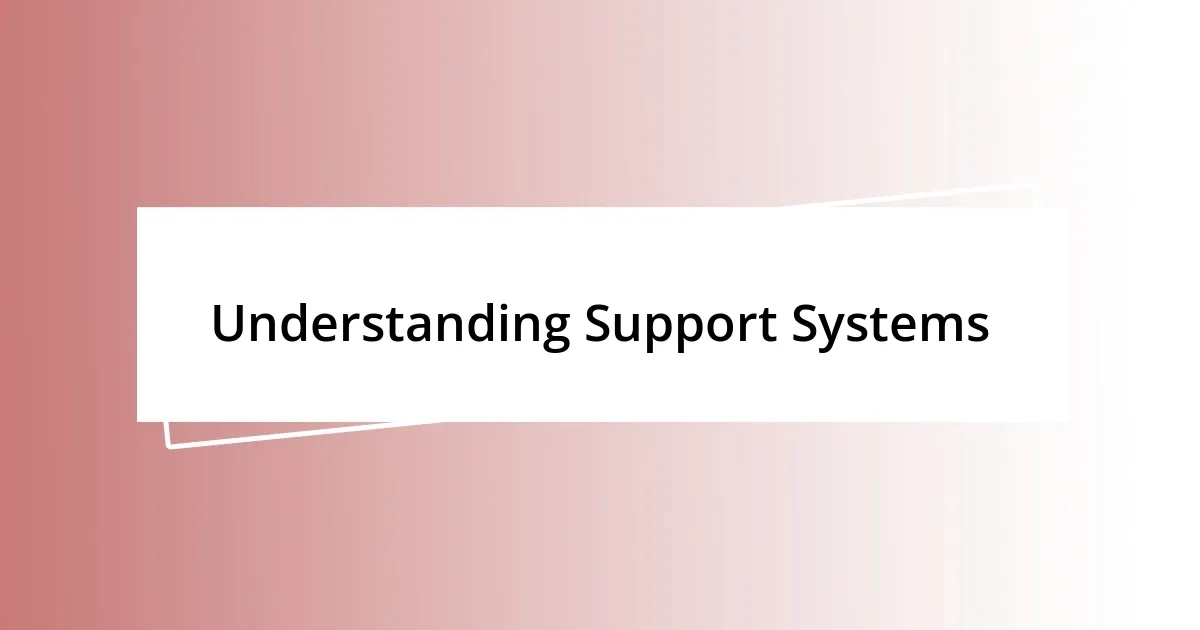
Understanding Support Systems
Support systems are often the invisible scaffolding that holds our lives together. I remember a particularly tough time in my life when I felt completely isolated—a moment when I finally realized that the friends I had taken for granted were a vital part of my network. Have you ever felt alone even in a crowded room? It’s crucial to understand that our support systems can come from unexpected places.
At its core, a support system is made up of individuals who provide emotional, practical, or informational support. When I began to consciously acknowledge those individuals in my life, I felt a profound sense of relief. It sparked a realization: our friends, family, coworkers, and even mentors can give us the strength to weather life’s storms. Think about who lifts you up; do you recognize the value they bring?
Recognizing and nurturing these relationships is essential. During a particularly challenging project at work, turning to my colleagues for assistance not only alleviated my stress but also reinforced our bond. How often do we hesitate to reach out when help is just a call away? By engaging with our support systems, we create a safety net that allows us to thrive amidst challenges.
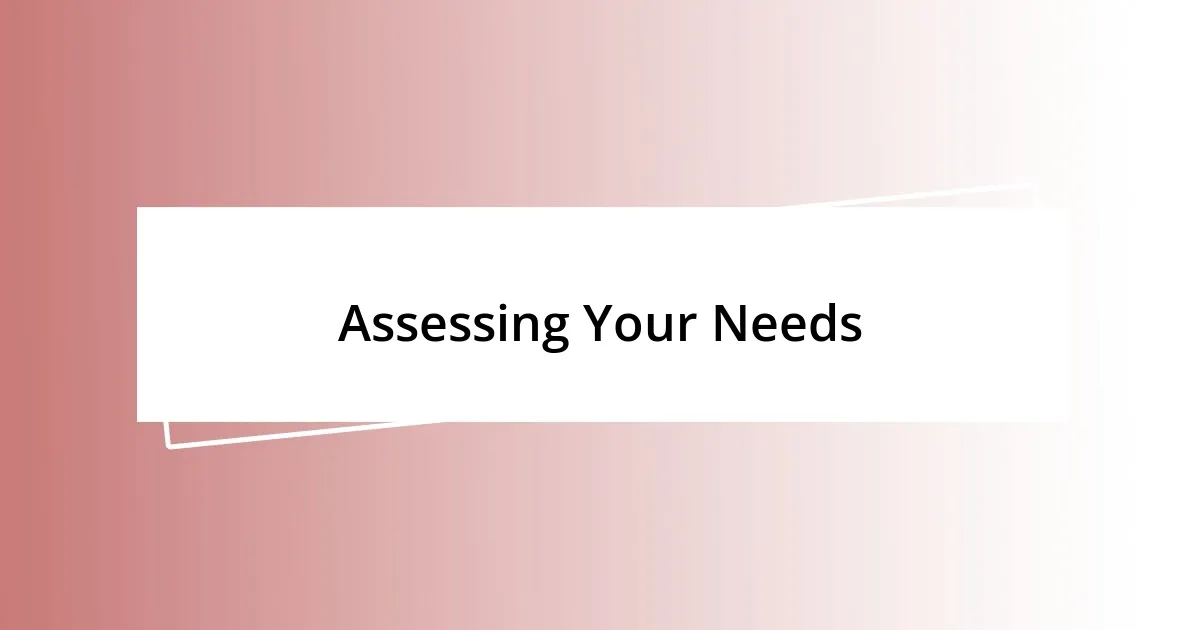
Assessing Your Needs
Assessing your needs can feel like peeling an onion—layer by layer, you discover more about yourself. I once felt overwhelmed, unsure of what kind of support I truly required. Taking a moment to jot down the areas where I struggled—like emotional support during tough times or practical assistance with daily tasks—helped clarify my needs. Have you ever made a list like this? It can be quite illuminating.
When I compared my emotional needs against the relationships in my life, a clear picture started to form. There was comfort in recognizing which friends offered a listening ear and which were more proactive in providing help. I had a friend who excelled at brainstorming solutions; whenever I reached out, I felt a new energy wash over me. In contrast, a family member was always ready for a heart-to-heart chat, helping me sort through my feelings. Understanding these differences paved the way for more meaningful connections.
Lastly, don’t underestimate the power of feedback. Asking trusted friends how they perceive your needs can yield surprising insights. I once asked a close friend about moments when they felt I needed support; her perspective shifted my understanding of my own vulnerabilities. It’s as if a light bulb flicked on, revealing the specific types of support I had overlooked before. Have you ever gathered such feedback? It’s not just about finding help—it’s about fostering deeper connections along the way.
| Support Needs | Potential Support Sources |
|---|---|
| Emotional Support | Friends, Family |
| Practical Help | Colleagues, Neighbors |
| Mentorship | Professionals, Online Communities |
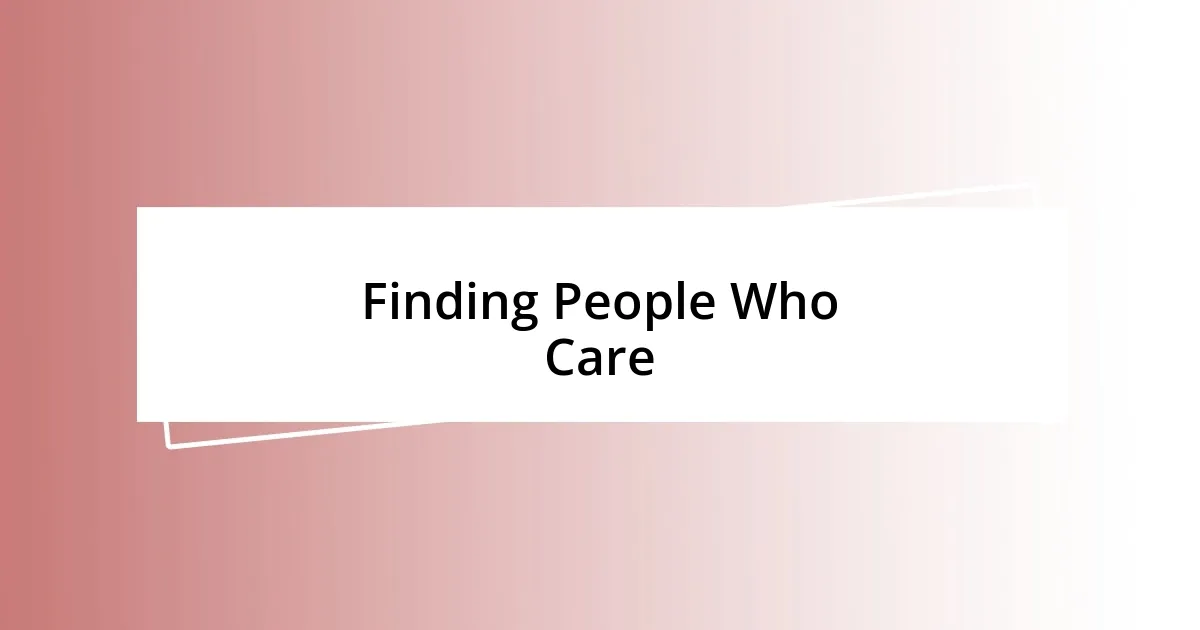
Finding People Who Care
Finding genuine connections can sometimes feel like searching for a needle in a haystack. I recall a time when I attended a local meetup, uncertain about what to expect. As I engaged in conversations, I was surprised by how quickly we bonded over shared experiences, highlighting the innate human desire to be heard and understood. It took me stepping outside my comfort zone to recognize that people often care more than we realize; all it takes is the courage to initiate a conversation.
Here are some steps to help you discover those caring individuals:
- Explore New Spaces: Attend events, workshops, or community gatherings.
- Be Open and Vulnerable: Share a little about yourself; it invites others to do the same.
- Engage Regularly: Consistent interaction fosters deeper connections over time.
- Observe Genuine Interest: Pay attention to those who listen actively and offer support.
- Reach Out to Old Friends: A simple message can reignite old bonds.
The beauty of finding these connections lies in their ability to transform your life. When someone takes the time to show they care, it creates a ripple effect. For me, reconnecting with an old friend during a difficult phase reminded me of the importance of nurturing relationships. We quickly fell back into a rhythm, sharing our challenges and triumphs. It reinforced my belief that when we reach out, we often find that others are just as eager to share their journeys.
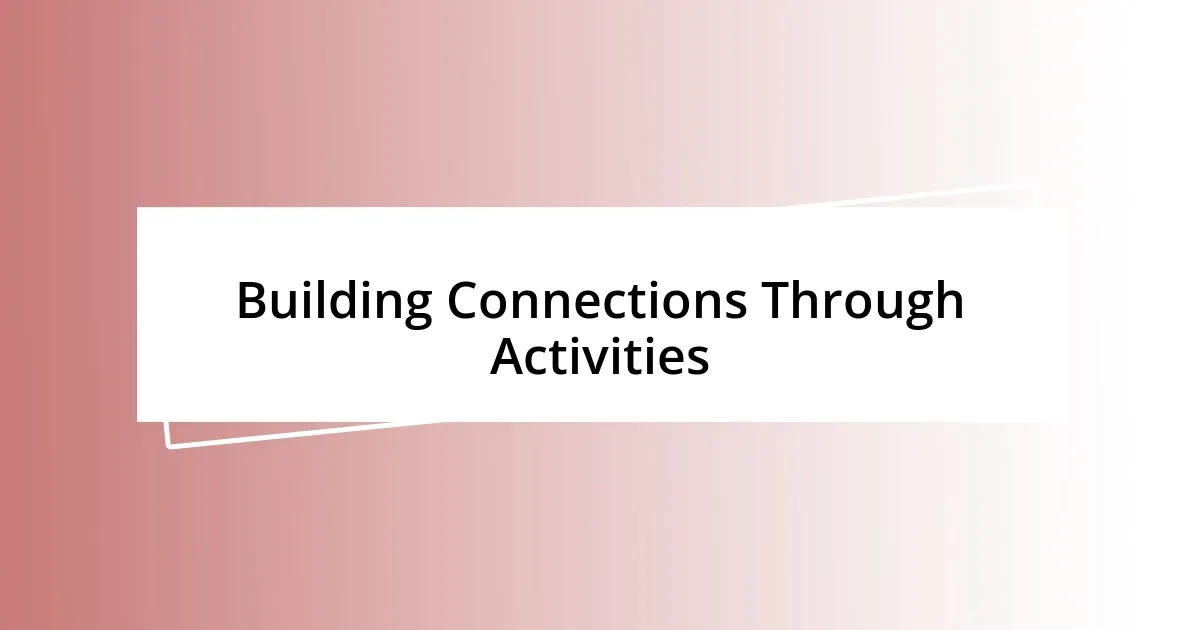
Building Connections Through Activities
Participating in activities is one of the best ways to forge genuine connections. I remember taking up a pottery class on a whim; it was something completely out of my comfort zone. But as we molded the clay together, laughter and shared frustrations broke the ice. Have you ever noticed how a bit of creative chaos can bring people together? It’s like a glue that binds those who are navigating the same challenges while finding joy in the process.
What’s fascinating is how shared experiences in activities can lead to unexpected support systems. During a weekend hiking trip, I ended up in a group where we discussed not just the trails but our personal journeys. I found myself opening up about struggles I hadn’t spoken of in ages, and—surprisingly—others did too. It felt liberating to share vulnerabilities while bonding over the breathtaking views. Isn’t it amazing how a common goal, even if it’s just reaching the summit, can foster such deep connections?
Moreover, consistency in engaging in these activities can nurture long-lasting friendships. I’ve seen how regular involvement in community events transforms acquaintances into a solid support network. Just last month, I joined a book club. At first, it was about discussing the latest read, but slowly we began sharing life stories and supporting one another through life’s ups and downs. Have you ever found that sense of belonging in a group? Those moments solidify the realization that people often connect over shared passions, reminding me that we’re all in this together.
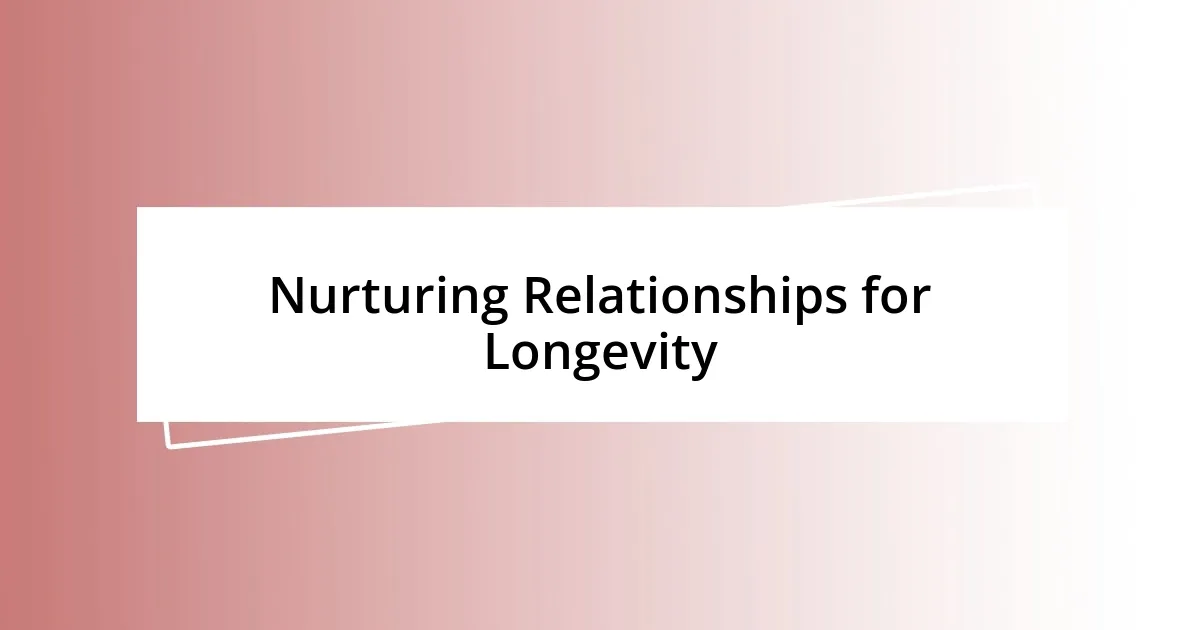
Nurturing Relationships for Longevity
Nurturing relationships is like tending to a garden; it requires intentionality and care. A few months ago, I decided to host a simple dinner for a small group of friends. I aimed to create a warm atmosphere where everyone felt comfortable sharing their thoughts. The conversations flowed effortlessly, and I realized how crucial it is to cultivate these moments of connection. Have you ever felt the magic that arises when you gather people in a welcoming space?
I’ve learned that small acts can lead to profound growth in relationships. Sending a message to check in or sharing a meme that reminded me of someone has made a significant impact. Recently, I started a weekly “gratitude text” where I message a friend to share something I appreciate about them. It’s a delightful practice that deepens our bond. How often do you take the time to recognize the people who enrich your life?
Lastly, I believe that investing time in nurturing relationships not only supports others but also enriches our own lives. Some of my most meaningful connections have blossomed from simply being present during someone else’s tough times. A friend once called me in tears, and just listening to them opened the door for deeper dialogue. It made me realize that in those moments of vulnerability, real support emerges. Isn’t it incredible how showing up, even when it’s difficult, can create lasting ties between us?
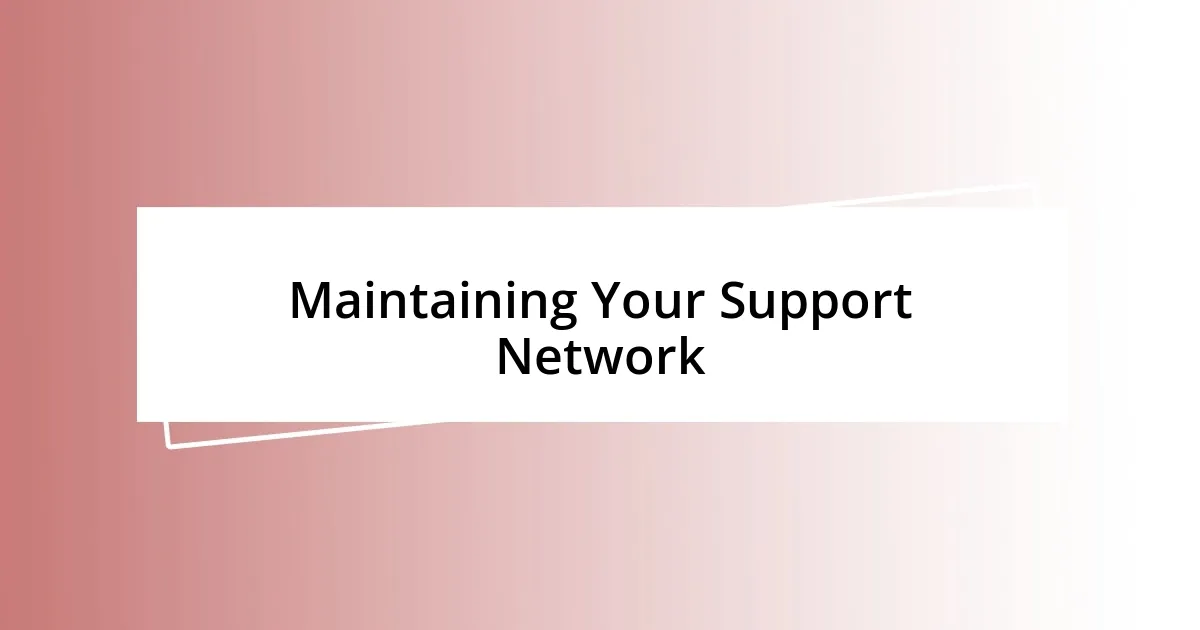
Maintaining Your Support Network
Maintaining your support network isn’t just about checking in; it’s about being genuinely present. The other day, I found myself scrolling through past messages and realized how much I missed some friends. So, I organized a spontaneous coffee date with one of them. It reminded me that sometimes, it’s the unplanned moments that reignite connections. Have you ever experienced the joy of reconnecting with someone after a long time?
On a practical level, I’ve come to understand that regular communication is key to keeping relationships alive. I set aside a few minutes each week to reach out to different friends. It could be as simple as a text or a quick phone call. This habit has transformed my network from a distant collection of acquaintances into a dynamic group of supportive individuals. Have you thought about how a little effort can go a long way in maintaining friendships?
Finally, I’ve learned the importance of openness in these connections. Recently, I shared a personal struggle with a colleague. To my surprise, they opened up about a similar issue, and we found common ground. That vulnerability not only deepened our bond but also created a safe space for honest conversations. It’s moments like these that highlight the power of mutual support. Have you ever felt that overwhelming relief when someone else can relate to what you’re going through?
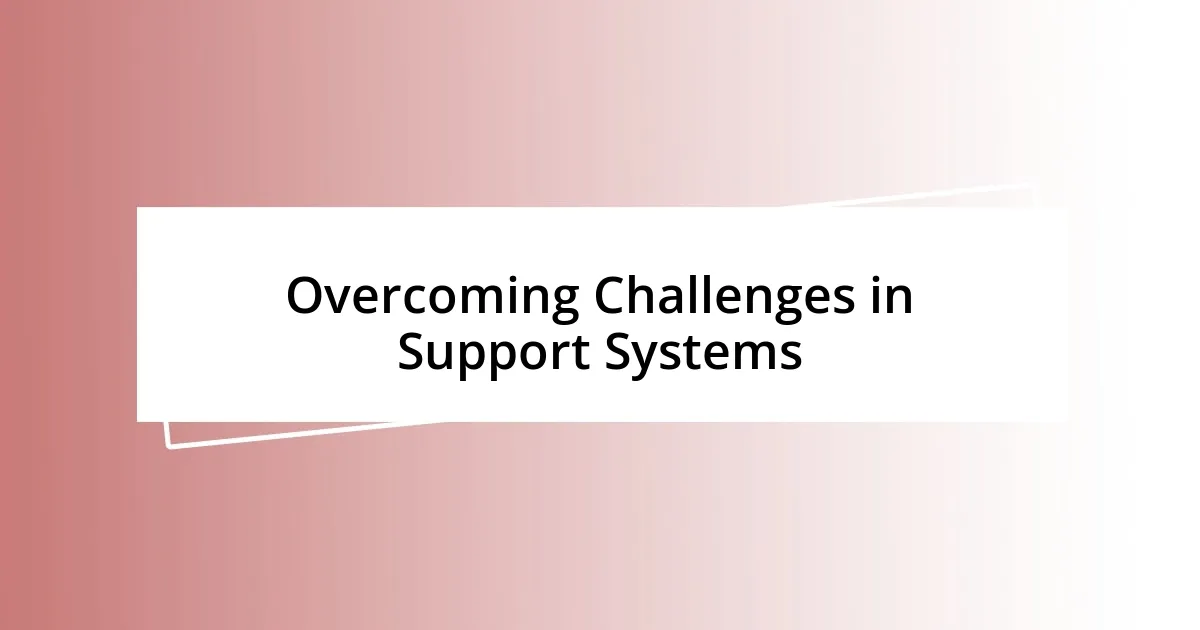
Overcoming Challenges in Support Systems
Overcoming challenges in support systems often means facing discomfort head-on. I once hesitated to express my needs to a friend, fearing it might push them away. But when I finally opened up, I discovered that vulnerability can invite even deeper connections. Have you ever found that sharing your struggles actually strengthens your bonds?
Sometimes, there’s a misconception that support systems are perfect networks of understanding and sympathy. I remember a period when I needed help, but I felt my friends were wrapped up in their own lives. It was tough to confront this reality, and I almost withdrew. Instead, I reached out and discussed how their absence affected me; it prompted honest conversations and a rediscovery of our shared commitment to one another. Isn’t it eye-opening to realize how addressing these issues can renew a support system?
Finally, navigating differing expectations can be tricky. I experienced this when a friend expected me to respond in a specific way during a rough patch. Initially, it created tension, but discussing our perspectives led to greater empathy and understanding. This experience taught me the value of communicating boundaries and defining roles within support systems. Have you faced moments when clarifying expectations turned tension into understanding?
